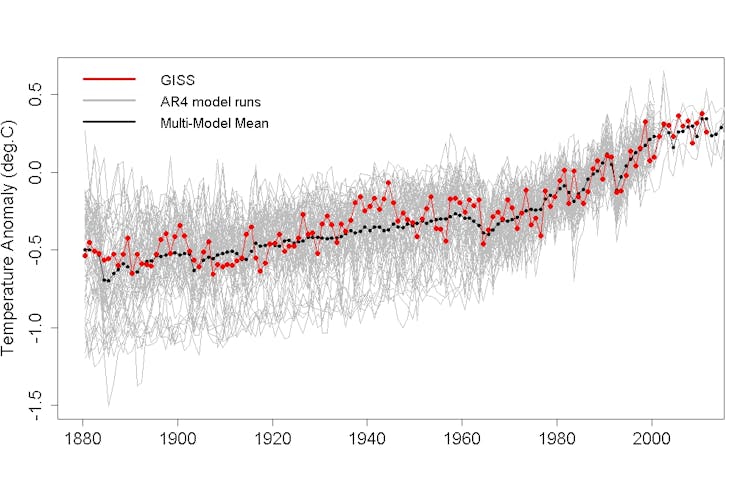The warm start to Australian spring has been accompanied by a deluge of pseudoscience. Anti-vaccination campaigners and aliens made appearances, but the deluge was primarily climate pseudoscience in the Murdoch Press and talk radio.
The deluge included interviews with, and an op-ed by, retired scientist Bob Carter, a lead author of the Non-governmental International Panel on Climate Change (NIPCC) reports.
What is the NIPCC? Is it just like the IPCC, but with an “N”?
Well, no. The NIPCC is a group of climate change “sceptics”, bankrolled by the libertarian Heartland Institute to promote doubt about climate change. This suits the Heartland Institute’s backers, including fossil fuel companies and those ideologically opposed to government regulation.
The NIPCC promotes doubt via thousand-page reports, the latest of which landed with a dull thud last week. These tomes try to mimic the scientific reports of the Intergovernmental Panel on Climate Change (IPCC), right down to the acronym. However, unlike the IPCC, the NIPCC reports are works of partisan pseudoscience.
Consensus and adversaries
We know 97% of climate scientists have concluded, based on the evidence, that anthropogenic climate change is real. Contrary to recent claims in the media, there is remarkably good agreement between models of climate change and the temperature data.
There has been 0.12 degrees of warming per decade over the past 50 years, which is very similar to the expected warming of 0.13 degrees per decade.

How does the NIPCC spread doubt, given the temperature record and consensus of professional scientists? The answer is manufactured partisanship.
The IPCC (no N) produces a comprehensive and critical overview of climate change science for governments. It is written by hundreds of scientists, anyone can volunteer to review drafts, and those comments appear online.
IPCC reports openly discuss the strengths, weaknesses, criticisms and uncertainties of the science. The reports provide policy makers with a range of plausible outcomes given rising atmospheric CO2.
Heartland’s NIPCC partially mimics the IPCC, but with key differences. It is written and reviewed by dozens of people, almost exclusively drawn from the “sceptic” community, and is consequently highly partisan.
Indeed, the NIPCC advocates an adversarial approach to assessing climate science, with partisan “teams” arguing for different positions.
This call for an adversarial debate has also been repeated in recent op-eds by Bob Carter, Judith Curry and Gary Johns.
The call for adversarial debate is a variant of the debate ploy, a common pseudoscience tactic. At first glance having two teams present competing positions seems entirely reasonable, but this approach only works if the intended audience can effectively assess the arguments presented.
Can a general audience or policy makers distinguish truth from fiction when it comes to technical aspects of climate science?
Will a general audience know when someone is deliberately confusing transient climate response (TCR) with equilibrium climate sensitivity (ECS)? Will they know that TCR and ECS differ by roughly a factor of two? Perhaps not.
Will they triangulate the truth, assuming technical arguments they don’t understand have equal merit? Quite possibly.

This is the fundamental problem with trying to resolve scientific questions via an adversarial approach, and this problem isn’t new. Back in 1920, a large audience was unable to assess competing claims about the general relativity when Albert Einstein debated Phillip Lenard. That debate generated column inches and acrimony, but did nothing to advance science.
In this context, the IPCC’s comprehensive approach to evaluating climate science makes sense, with experts providing an overview of the science for policy markers. It also explains why the minority wishing to delay action are promoting an adversarial approach.
Zombie science
Does the NIPCC fairly and robustly assess the science? No. It is all too easy to find “debunked” papers getting a second life in latest NIPCC report.
Sea levels around Australia have risen by roughly 100mm during the past century, but Boretti (2012) claimed sea levels rose by only 50mm over that period. However, John Hunter and I found that Boretti’s own flawed analysis gives an answer of 78mm. While Boretti himself grudgingly accepts that 50mm is wrong, this erroneous value is reported as fact by the NIPCC.
IPCC AR4 concluded that CO2 is the cause of increased global temperatures, with natural variability not playing a major role. It was thus surprising when McLean et al. (2009) concluded that global temperatures were varying largely in response to the El Niño–Southern Oscillation.
However, McLean’s analysis effectively subtracted out the long-term trend caused by CO2, so they only measured the (natural) causes of short-term variability.
Foster et al. (2010) thoroughly debunked McLean et al., and McLean perhaps debunked himself by predicting 2011 would be the coolest year since 1956. That year was anything but cool. However, the McLean et al. conclusions are reported as fact in the latest NIPCC report, with no mention of the Foster et al. commentary.
Dead science lives in the NIPCC reports: Boretti and McLean are just the tip of the iceberg. Houston & Dean (2011), Scafetta & West (2005) and others also appear, all without mention that these papers were followed by highly critical commentaries.
It is this deliberately partisan, selective, and uncritical approach to evidence that marks the NIPCC report as a work of pseudoscience.
Bob Carter’s op-ed for the Daily Telegraph was titled “Report gives the truth about climate at last”, but I prefer a different description of NIPCC reports – one that may not be fit for publication.

